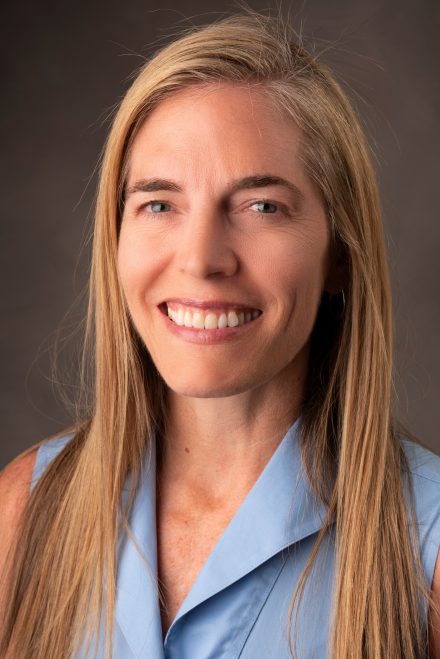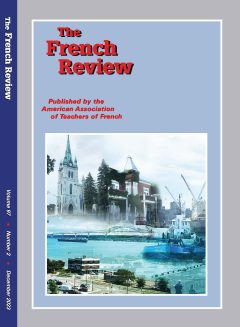The French Review published Adamson's articles about the value of using modern French stand-up comedy to teach language and culture from diverse perspectives.
Stand-up comedy is having a moment in France, and Associate Professor of French Sophie Adamson has published two articles in The French Review about how teachers can tap into it to deepen learning of French language, culture and society.
Adamson’s articles, “Seriously Funny: Stand-Up Comedy Clips for Diverse Voices in French,” and “Stand-Upper Shirley Souagnon Speaks Out: A Diverse Voice for the L2 Classroom,” appear in The French Review Vol. 97.2, which was published in December 2023.

The flourishing of comedic performance deserves the “serious attention” of instructors of French who are committed to sociocultural diversity in their curricula, she said. The articles describe the thriving comedy scene that has led to an explosion of clips of humorists who are commenting on French society and challenging audiences to question cultural assumptions around subjects such as nationality, race, religion, gender and sexuality.
Given the growing collection of videos on YouTube with options to slow the playback speed, read full transcripts, and choose closed captioning in French, Adamson encourages instructors to consider stand-up clips that could accompany, diverge from, and/or enhance their primary resources.
In the journal’s online dossier pédagogique, she features Franco-Ivorian humorist Shirley Souagnon with sample topics and activities intended for upper-intermediate and advanced language learners.
At Elon, Adamson first taught FRE 3062 Seriously Funny: French Social Criticism through Humor in spring 2021 and again in spring 2023.
“I designed our content around ‘seriously funny’ social criticism related to race, ethnicity, gender, sexuality and religion to tackle topics around inclusion and diversity,” Adamson said.

Doing so added diverse, non-academic voices and perspectives into the curriculum and replaced traditional written sources with multimodal resources. Those aspects of the course “strengthen students’ listening comprehension, vocabulary, critical thinking skills, and motivation,” Adamson said. “Research in second language acquisition shows a correlation between exposure to multimodal input in the second language, language proficiency development and learner motivation.”
Students said the course boosted both their language comprehension and intercultural competency. “The class was incredibly unique and has been one of the best I’ve taken so far. It was so interesting to look at issues in France through stand-up comedy,” one student commented at the end of the course.
Adamson is careful to select comedic content that aligns with course goals and challenges stereotypes. She also gauged students’ perceptions and learning outcomes through written assignments, in-class discussions and anonymous surveys.
“Instructors of French will need to decide for themselves whether to adopt any of my examples depending on their comfort levels, course goals and the institutional culture in their high school or college environments,” Adamson said. “I’m fortunate to work at Elon and in the Department of World Languages and Cultures where we support instructors’ autonomy and creativity. My colleagues and I actively seek opportunities to de-center the curriculum and infuse content that celebrates inclusive excellence as we tackle our goals around second language acquisition, critical thinking, writing and intercultural competency.”


